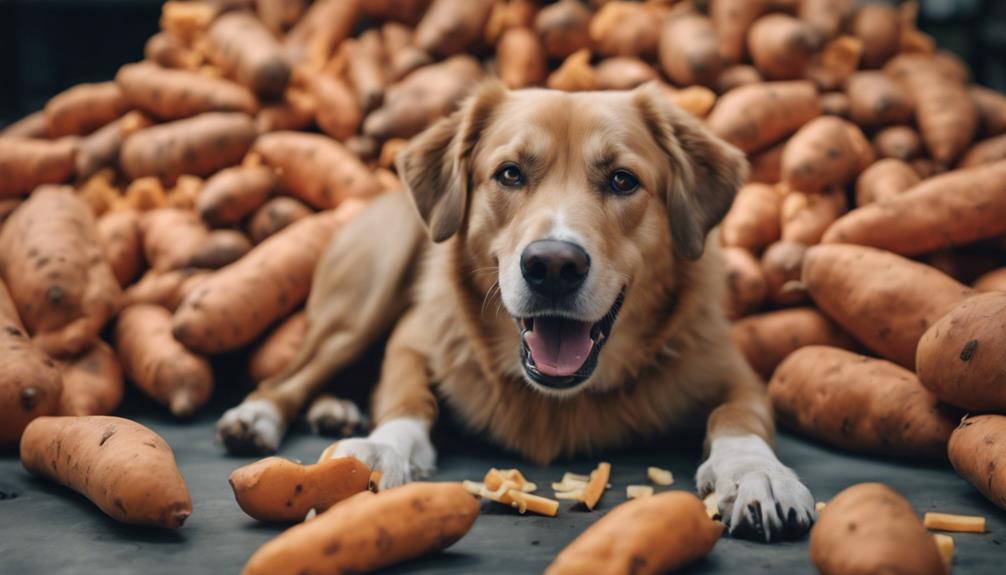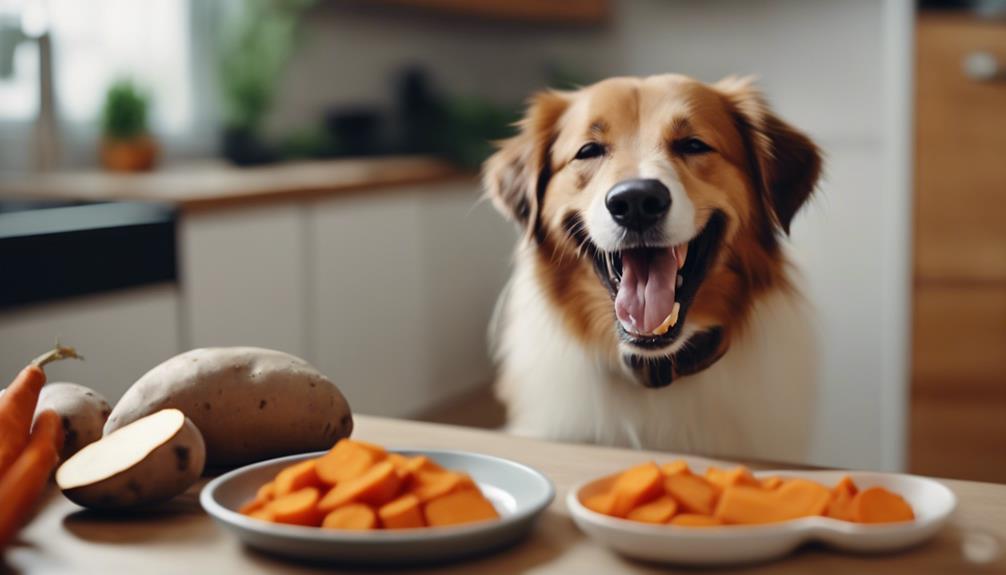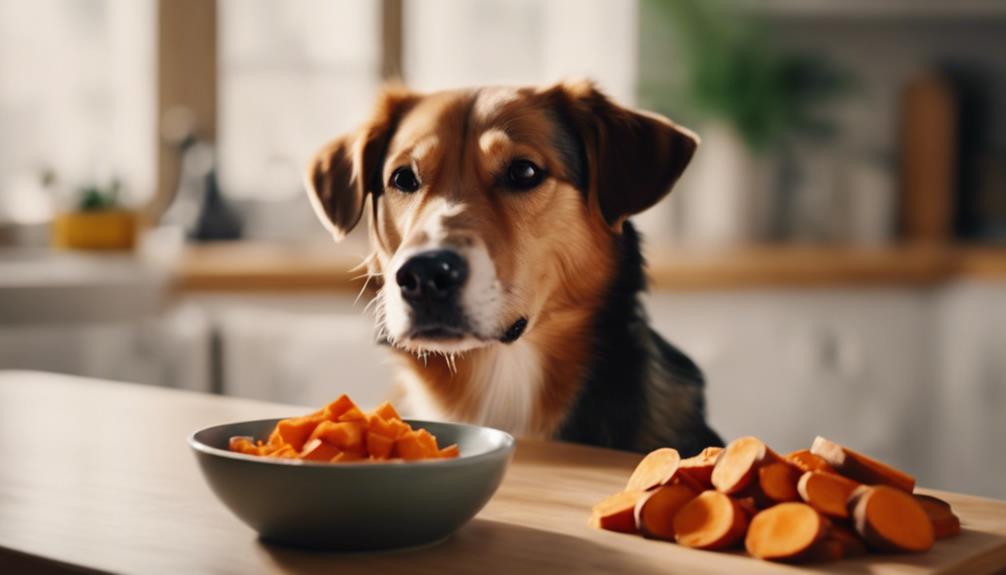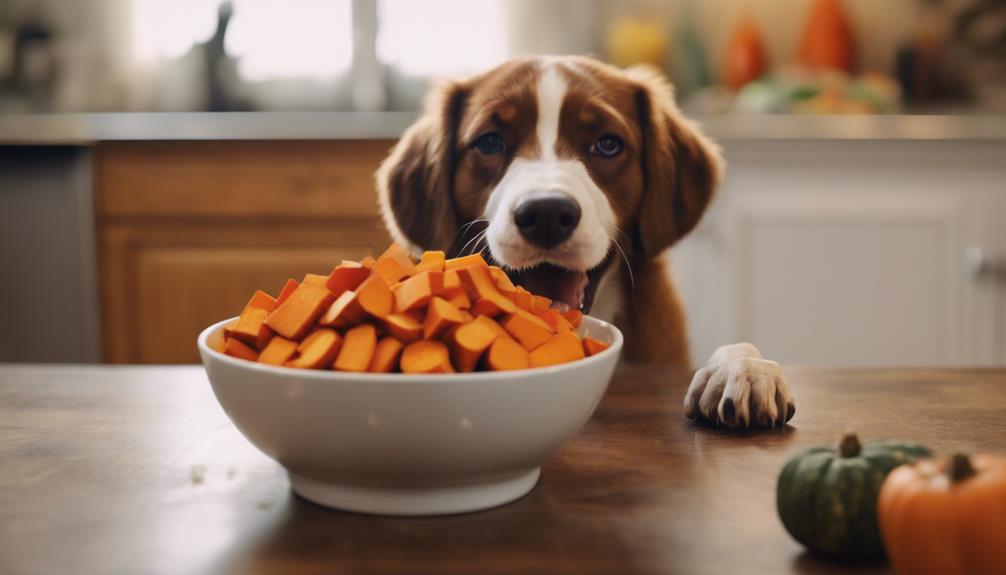Exploring the inclusion of sweet potatoes in a dog's diet can be a nuanced endeavor, balancing nutritional benefits with potential risks.
Understanding how to safely incorporate this root vegetable into your pup's meals is crucial for their well-being.
As we navigate the intricacies of feeding sweet potatoes to dogs, it becomes evident that a thoughtful approach is essential.
The considerations of portion sizes, preparation methods, and monitoring intake levels are pivotal in ensuring a harmonious blend of canine nutrition and culinary delight.
Key Takeaways
- Sweet potatoes are safe and nutritious for dogs but should be fed in moderation.
- Serve sweet potatoes cooked and without skin to prevent stomach upset.
- Consult a vet before including sweet potatoes in your dog's diet, especially if they have health conditions.
- Monitor sweet potato intake to avoid health issues like pancreatitis and weight gain.
Safety and Benefits of Sweet Potatoes
Featuring a rich array of vitamins and minerals, sweet potatoes are not only safe for dogs but also offer various health benefits when included in their diet. These root vegetables contain essential nutrients like vitamin A, vitamin C, and fiber, which can contribute to a dog's overall well-being.
The antioxidants in sweet potatoes can help boost the immune system and promote healthy digestion. Additionally, the low-fat content in sweet potatoes makes them a suitable option for dogs watching their weight.
When fed in moderation and prepared appropriately, sweet potatoes can be a nutritious and tasty addition to a dog's diet, providing a flavorful alternative to commercial treats.
Serving Sweet Potatoes to Dogs
When considering the appropriate way to incorporate sweet potatoes into a dog's diet, it is essential to focus on the method of serving to ensure optimal digestion and nutritional benefits.
- Serve sweet potatoes steamed, boiled, or dehydrated to enhance digestibility.
- Skin sweet potatoes before serving to prevent stomach upset in some dogs.
- Cook sweet potatoes thoroughly as raw ones are challenging for dogs to digest.
- Limit sweet potatoes in the diet of diabetic or overweight dogs due to their high glycemic index.
Risks and Considerations of Feeding

Considerations regarding the feeding of sweet potatoes to dogs encompass potential health risks that owners should be mindful of to ensure their pets' well-being. One of the main risks is pancreatitis, especially if a dog consumes a large amount of sweet potatoes. Additionally, some commercially available diets with potatoes have been linked to heart condition Dilated Cardiomyopathy (DCM) in dogs. It is crucial to consult a vet before making any dietary changes and to monitor sweet potato intake to prevent any health issues. Be cautious with recipes containing sweet potatoes due to their high-calorie and fat content.
| Risks and Considerations of Feeding Sweet Potatoes to Dogs |
|---|
| Watch for pancreatitis if a dog consumes a large amount of sweet potatoes. |
| Some commercially available diets with potatoes linked to heart condition DCM in dogs. |
| Consult a vet before switching your dog's diet. |
| Be cautious with recipes containing sweet potatoes due to high calories and fat content. |
| Monitor sweet potato intake to prevent health issues. |
Different Forms of Sweet Potatoes
Upon exploring the various forms in which sweet potatoes can be offered to dogs, it is essential to consider moderation and caution in introducing these options to prevent potential health complications. When considering different forms of sweet potatoes for your pup, keep the following in mind:
- Sweet potato fries can be a tasty treat but should be given sparingly.
- Sweet potato pie can be shared occasionally but avoid large servings.
- Buttered sweet potatoes are acceptable in small amounts.
- Sweet potato-based recipes should only constitute a small portion of your dog's diet to maintain a balanced nutritional intake.
Related Articles on Dog Nutrition

Exploring dog nutrition, it is important to consider various food options that can benefit canine health and well-being. When it comes to dog nutrition, there are several other food choices that can be included in a dog's diet to provide a balanced and healthy meal. Below is a table highlighting some related articles on dog nutrition:
| Food | Acceptability for Dogs | Serving Suggestions |
|---|---|---|
| Pumpkin | Safe | Can be served pureed or as a topper. |
| Blueberries | Safe | Serve fresh or frozen as a treat. |
| Broccoli | Safe | Serve cooked and chopped in small pieces. |
| Pears | Safe | Remove seeds and core before serving. |
| Peaches | Safe | Remove pit and serve in small amounts. |
These food items can be included in a dog's diet in moderation to provide a diverse range of nutrients and flavors.
Preparing Sweet Potatoes Safely
When it comes to incorporating sweet potatoes into your dog's diet, ensuring proper preparation techniques is essential for their safety and well-being. Here are some tips to prepare sweet potatoes safely:
- Wash sweet potatoes thoroughly to remove any dirt or chemicals.
- Peel the sweet potatoes to eliminate any potential digestive issues.
- Cut the sweet potatoes into small, bite-sized pieces for easy consumption.
- Cook sweet potatoes by boiling, steaming, or baking to make them soft and easier for your dog to digest.
Monitoring Sweet Potato Intake

Maintaining a balanced consumption of sweet potatoes is crucial for ensuring optimal health and nutrition in dogs. Monitoring your pup's sweet potato intake can help prevent overfeeding and potential health issues. To assist you in managing your dog's sweet potato consumption effectively, consider the following guidelines:
| Signs of Overfeeding Sweet Potatoes | Action to Take |
|---|---|
| Digestive issues such as diarrhea | Reduce sweet potato portion size or frequency of feeding |
| Weight gain | Decrease sweet potato intake and consult a veterinarian for dietary advice |
| Pancreatitis symptoms | Immediately stop feeding sweet potatoes and seek veterinary assistance |
Potential Health Concerns With Sweet Potatoes
While sweet potatoes can offer various nutritional benefits to dogs, there are potential health concerns associated with their consumption that pet owners should be mindful of. When feeding sweet potatoes to your pup, consider the following:
- Digestive Issues: Excessive consumption may lead to digestive upset or diarrhea.
- Pancreatitis Risk: Large amounts of sweet potatoes can increase the risk of pancreatitis in dogs.
- Weight Gain: Due to their high carbohydrate content, overfeeding sweet potatoes can contribute to weight gain.
- Heart Conditions: Commercially available diets containing sweet potatoes have been linked to heart condition DCM in dogs.
It is essential to monitor your dog's sweet potato intake and consult with a veterinarian to ensure their diet is balanced and safe.
Sweet Potato Alternatives for Dogs

Exploring alternative options to sweet potatoes can provide a balanced and varied diet for dogs while addressing potential health concerns associated with their consumption. When looking for substitutes, consider pumpkin, carrots, and green beans. These alternatives offer similar nutritional benefits to sweet potatoes and can be easily incorporated into your dog's meals. Here is a comparison table to help you make an informed choice:
| Sweet Potato Alternatives | Nutritional Benefits | How to Serve |
|---|---|---|
| Pumpkin | High in fiber and | Serve steamed, pureed, or frozen as a treat. |
| beta carotene. | ||
| Carrots | Rich in vitamin A for | Serve raw, steamed, or frozen as a crunchy snack. |
| healthy eyes. | ||
| Green Beans | Low in calories and | Serve steamed, chopped, or frozen as a light snack. |
| high in vitamins C and K. |
Conclusion
In conclusion, sweet potatoes can be a safe and beneficial addition to a dog's diet when served in moderation and prepared properly. While they offer valuable nutrients and health benefits, it is important to be mindful of potential risks and monitor intake to prevent any adverse effects.
By following recommended guidelines and considering alternative options, pet owners can ensure that their canine companions enjoy a balanced and nutritious diet that supports their overall well-being.




